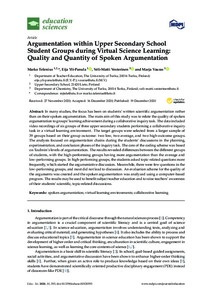Argumentation within Upper Secondary School Student Groups during Virtual Science Learning: Quality and Quantity of Spoken Argumentation
Eija Yli-Panula; Veli-Matti Vesterinen; Marko Telenius; Marja Vauras
https://urn.fi/URN:NBN:fi-fe2021042822384
Tiivistelmä
In many studies, the focus has been on students’ written scientific argumentation rather than on their spoken argumentation. The main aim of this study was to relate the quality of spoken argumentation to groups’ learning achievement during a collaborative inquiry task. The data included video recordings of six groups of three upper secondary students performing a collaborative inquiry task in a virtual learning environment. The target groups were selected from a larger sample of 39 groups based on their group outcome: two low, two average and two high-outcome groups. The analysis focused on argumentation chains during the students’ discussions in the planning, experimentation, and conclusion phases of the inquiry task. The core of the coding scheme was based on Toulmin’s levels of argumentation. The results revealed differences between the different groups of students, with the high-performing groups having more argumentation than the average and low-performing groups. In high-performing groups, the students asked topic-related questions more frequently, which started the argumentative discussion. Meanwhile, there were few questions in the low-performing groups, and most did not lead to discussion. An evaluation scheme for the quality of the arguments was created and the spoken argumentation was analyzed using a computer-based program. The results may be used to benefit subject teacher education and to raise teachers’ awareness of their students’ scientific, topic-related discussions.
Kokoelmat
- Rinnakkaistallenteet [19207]
